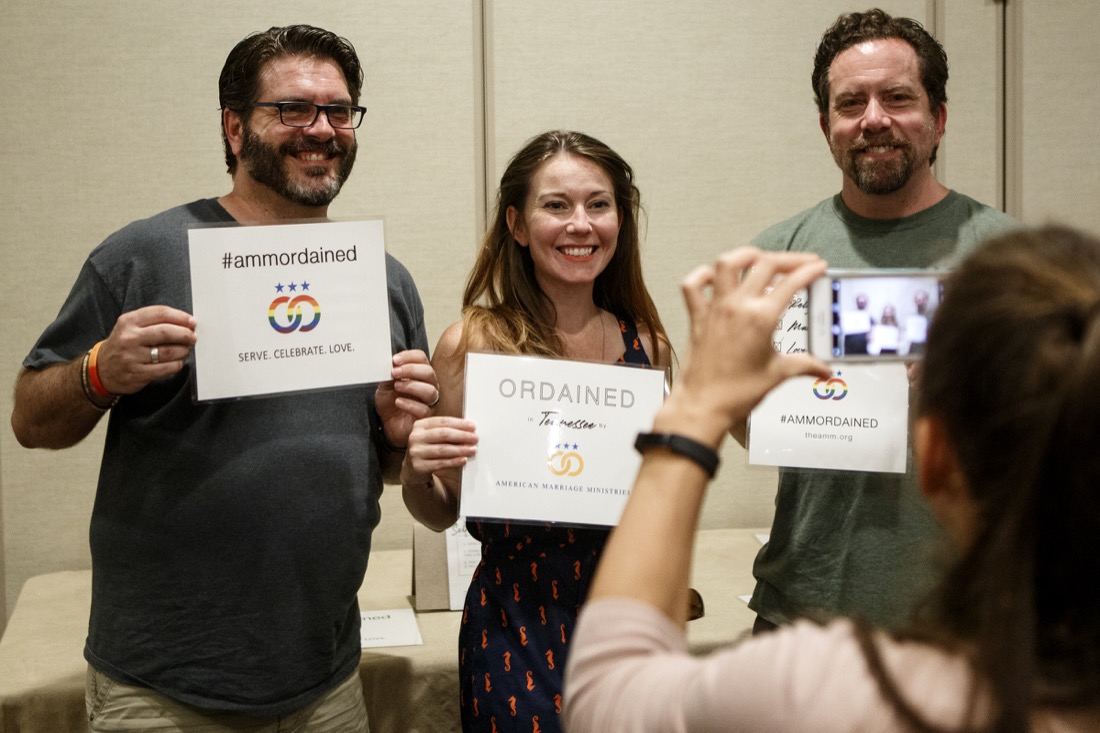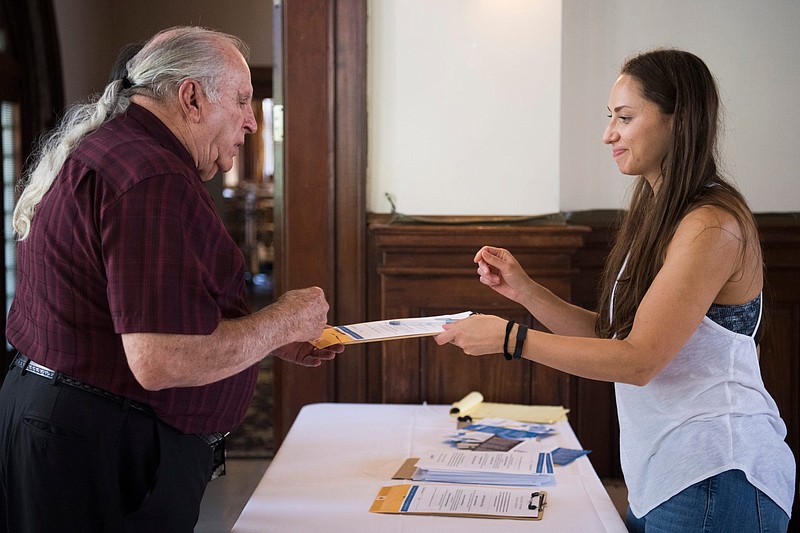NASHVILLE - More than 140 new Tennessee statutes took effect Monday, but the outcome of a controversial law that bars ministers ordained online from solemnizing marriages awaits a Wednesday hearing in U.S. District Court on a challenge to its legality.
The law, which has made headlines across the country, was supposed to go into effect July 1.
But Seattle-based Universal Life Church Monastery, which says it's the world's largest online religious organization, and four Tennesseans who had been ordained by the church filed suit last week challenging the statute and seeking a temporary restraining order.
Universal Life Church Monastery, a nonprofit group, charges the law violates the freedoms of speech and religion in both the Tennessee and U.S. constitutions.
Last week, Chief U.S. District Judge Waverly D. Crenshaw of the Middle District of Tennessee issued an order maintaining the legal "status quo," effectively delaying implementation of the law pending outcome of court arguments over the request for the temporary restraining order.
The new law last week also set off a scramble by American Marriage Ministries, which also ordains ministers online. A team of American Marriage Ministries officials hit cities across the state, including Chattanooga, and conducted in-person ordinations using paper for more than 1,300 Tennesseans.
Among those recertified was Bobby Prince of Chattanooga, who told the Times Free Press he officiated at more than 100 weddings last year, including for people who didn't want to be married through a church or were members of the LGBTQ community.
"There's no secret that the bill was passed to deter [same-sex marriages]," Prince said. "It wasn't about heterosexual couples."
 American Marriage Ministries Operations and Outreach Manager Natasha Anakotta takes a photo of Jeremy Hall, left, Laura Fitness and Chris Leach after they filled out their paperwork to get ordained at the Hampton Inn at Hamilton Place on Tuesday, June 25, 2019, in Chattanooga, Tenn. Responding to the recent Tennessee law change outlawing online ordination programs American Marriage Ministries held an ordination training.
American Marriage Ministries Operations and Outreach Manager Natasha Anakotta takes a photo of Jeremy Hall, left, Laura Fitness and Chris Leach after they filled out their paperwork to get ordained at the Hampton Inn at Hamilton Place on Tuesday, June 25, 2019, in Chattanooga, Tenn. Responding to the recent Tennessee law change outlawing online ordination programs American Marriage Ministries held an ordination training.In the latest development on Monday, Tennessee Attorney General Herbert Slatery's office filed the state's 28-page response, arguing the motion for the temporary restraining order should be denied because "the applicable requirements ... have not changed in twenty years.
"[N]or has the State's publicly available interpretation that ULC's ordination of its ministers does not satisfy those requirements," the attorney general's office says.
As a result, the state argued, "there is no likelihood, let alone the requisite strong possibility, that Plaintiffs will prevail in their action for declaratory and injunctive relief."
Moreover, the state contends, the plaintiffs "cannot demonstrate that they will suffer irreparable injury absent a stay or that the public interest will be served by enjoining the application of Chapter 415 or § 36-3-301."
This year's revisions came in a bill sponsored by Rep. Ron Travis, R-Dayton, that added to the already lengthy list of government officials who can lawfully perform ceremonies state representatives and senators, elected officials and law enforcement chaplains.
As some conservative lawmakers balked - one openly fretted whether she might be sued for refusing to preside over a wedding ceremony - House Judiciary Committee Chairman Michael Curcio, R-Dickson, warned the bill had to pass because of its other provision.
"We have right now in Tennessee a situation where people are going online and getting an online ordination in order to marry friends and family members," Curcio warned. "Right now we don't know under the eyes of the law whether those are legal marriages. So we desperately need clarification."
In addition to barring anyone ordained online to officiate a wedding, the law declares that any marriage entered into before July 1, including ones solemnized by someone ordained online, would not be affected.
In its filing on Monday, the state cites previous attorney general opinions, including one from 1997, which concluded Universal Life Church Monastery ministers weren't authorized to solemnize marriages in Tennessee, and a following opinion after state lawmakers revised the law in 1998.
After the U.S. Supreme Court's historic Obergefell v. Hodges decision, which made same-sex marriage legal, the state attorney general's office said in response to an opinion request from Sen. Todd Gardenhire, R-Chattanooga, that the "process of becoming an ordained minister of the Universal Life Church has not materially changed since the issuance" of the office's 1997 opinion.
That, Slatery's office said, is because under UCLM's guidelines "[a]ll that is necessary to become ordained is that the applicant provide a 'valid legal' name, an e-mail address, a country, and a state, and confirm that he or she is 'over the age of 13.'"
The opinion concluded that ULCM's ordination "is not in any way related to the statutory requirement that the person be ordained by a spiritual leader" and "other than the click of a mouse, no 'considered, deliberate, and responsible act' as required is a prerequisite for ordination by the Universal Life Church."
In UCLM's complaint, the group's attorneys say Tennessee's law "authorizes religious leaders to solemnize marriages in Tennessee, but only for favored religions that appoint their ministers in a manner the State deems acceptable.
"The statute discriminates against ULC Monastery ministers by design and restricts their protected speech without justification," the complaint says. "As a result, Section 36-3-301, as amended by 2019 Public Chapter 415, unconstitutionally grants a preference to certain religions, burdens ULC Monastery's and its members' free exercise of religion, and violates the Church's and its ministers' freedom of speech."
Lewis King, executive director of American Marriage Ministries, said in an interview last Friday that the group felt obligated to rush to the state to conduct in-person ordinations because some 13,400 Tennesseans had previously gone through the group's online ordination process.
King noted the group as of early Friday afternoon had conducted some 1,300 in-person ordinations and still had several cities to hit.
"People are in a state of panic, which is why we acted as quickly as we did," King said, adding that while ULCM had challenged the law in federal court, "a lot of times these cases take time to get resolved."
"There are thousands of couples in Tennessee who don't know how they're going to move forward" with their marriage plans, King said. "There's like a crisis in the wedding industry."
Weddings have become a major industry in Sevier County, home to portions of the Great Smoky Mountains National Park, with a booming business in towns and cities, including Gatlinburg and Pigeon Forge, catering to couples tying the knot.
Sevierville businessman Ron Crivellone with the Smoky Mountain Wedding Association said he believes the issue "has only really affected a few of them."
The majority were chapels, "and of course, the owner of the chapels, the pastors, have been through ministry and it really didn't affect them," Crivellone said. "I think it only affected a few and by now I think they've found other ways to be ordained."
Crivellone said several chapels also "have stepped up to teach a class, you know, ordinations for those who want to be ordained that way."
Meanwhile, American Marriage Ministries conducted a number of local in-person ordinations, Crivellone said, "so that way those folks can still continue what they're doing because that was in person and not online.
"Therefore, I don't think the state can really do anything about that," he added.
Contact Andy Sher at asher@timesfreepress.com or 615-255-0550. Follow on Twitter @AndySher1.
